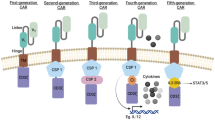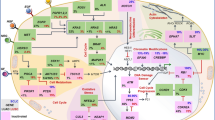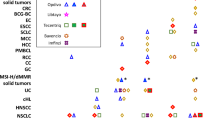Abstract
Purpose
Cancer-specific immunotherapy holds great promise as an emerging treatment for advanced colorectal cancer and may be combined with standard chemotherapy to provide a synergistic inhibitory action against tumor cells. To examine the interrelationship between the immune system and chemotherapy, we studied the induction of both CEA, a tumor-associated antigen, and MHC class I, a major component of the antigen presenting system, in response to a number of chemotherapeutic agents.
Methods
The effect of a selection of standard chemotherapeutics on MHC class I and CEA expression in human colorectal cancer cell lines was determined by flow cytometry and semi-quantitative RT-PCR. In addition, studies using mice bearing tumors derived from an injected murine colon cancer cell line were performed to determine if alteration in MHC class I expression occurs in vivo following continuous infusion of chemotherapeutic agents into the peritoneal cavity, as well as to facilitate correlations between expression of this factor and therapeutic effectiveness.
Results
All anti-cancer drugs examined, when given at IC50 values, induced expression of MHC class I protein in the human colon cancer cell line, COLO201. However, expression of CEA mRNA was only induced upon exposure to 5-FU, in contrast to obscure induction following CDDP and SN-38 treatment. Combined treatment with 5-FU and CDDP gave additional effect on CEA expression in COLO201 cells. Regarding the in vivo studies in mice, the size of the murine colon cancer cell-derived tumors was reduced only in response to treatment with CDDP, which also mediated the highest induction of MHC class I expression.
Conclusion
These results suggest that chemotherapeutic agents trigger the immune system and cancer-specific immunotherapy may be effective when used in combination with systemic chemotherapy.



Similar content being viewed by others
Abbreviations
- CEA:
-
Carcinoembryonic antigen
- MHC:
-
Major histocompatibility complex
- RT-PCR:
-
Reverse transcriptase-polymerase chain reaction
- CDDP:
-
Cis-diamminedichloroplatinum(II)
- 5-FU:
-
5-fluorouracil
- l-LV:
-
l-leucovorin
- CTL:
-
Cytotoxic T-lymphocyte
- TAA:
-
Tumor-associated antigen
- IFN:
-
Interferon
- ADCC:
-
Antibody-dependent cellular cytotoxicity
- IC50 :
-
50% growth inhibitory concentration
- MFV:
-
Mean fluorescence volume
- %PC:
-
Percentage of positive cells
- PBS:
-
Phosphate-buffered saline
- FACS:
-
Fluorescence-activated cell sorting
References
Aquino A, Prete SP, Greiner JW, Giuliani A, Graziani G, Turriziani M, De Filippi R, Masci G, Bonmassar E, De Vecchis L (1998) Effect of the combined treatment with 5-fluorouracil, gamma-interferon or folinic acid on carcinoembryonic antigen expression in colon cancer cells. Clin Cancer Res 4:2473–2481
Balkwill FR, Stevens MH, Griffin DB, Thomas JA, Bodmer JG (1987) Interferon gamma regulates HLA-D expression on solid tumors in vivo. Eur J Cancer Clin Oncol 23:101–106
Cangemi G, Millo E, Damonte G, Semino C, Pietra G, Benatti U, Melioli G (2000) alpha-Interferon treatment induces quantitative modifications of HLA class I-associated peptides eluted from cultured cancer cell lines. Tissue Antigens 55:212–218
Cappelletti D, Cardillo A, Bonanno E, Prete SP, Cucchiara G, Turriziani M, Greiner JW, Cottarelli A, Breda E, Aquino A, Bonmassar E, De Vecchis L (2000) Drug-induced modulation of carcinoembryonic antigen (CEA) expression in neoplastic cells from a patient with rectal cancer. J Exp Clin Cancer Res 19:467–469
Chatterjee SK, Tripathi PK, Chakraborty M, Yannelli J, Wang H, Foon KA, Maier CC, Blalock JE, Bhattacharya-Chatterjee M (1998) Molecular mimicry of carcinoembryonic antigen by peptides derived from the structure of an anti-idiotype antibody. Cancer Res 58:1217–1224
Cole DJ, Wilson MC, Baron PL, O’Brien P, Reed C, Tsang KY, Schlom J (1996) Phase I study of recombinant CEA vaccinia virus vaccine with post vaccination CEA peptide challenge. Hum Gene Ther 7:1381–1394
Cunningham D, Pyrhonen S, James RD, Punt CJ, Hickish TF, Heikkila R, Johannesen TB, Starkhammar H, Topham CA, Awad L, Jacques C, Herait P (1998) Randomised trial of irinotecan plus supportive care versus supportive care alone after fluorouracil failure for patients with metastatic colorectal cancer. Lancet 352:1413–1418
Douillard JY, Cunningham D, Roth AD, Navarro M, James RD, Karasek P, Jandik P, Iveson T, Carmichael J, Alakl M, Gruia G, Awad L, Rougier P (2000) Irinotecan combined with fluorouracil compared with fluorouracil alone as first-line treatment for metastatic colorectal cancer: a multicentre randomised trial. Lancet 355:1041–1047
Fisk B, Ioannides CG (1998) Increased sensitivity of adriamycin-selected tumor lines to CTL-mediated lysis results in enhanced drug sensitivity. Cancer Res 58:4790–4793
Foon KA, John WJ, Chakraborty M, Sherratt A, Garrison J, Flett M, Bhattacharya-Chatterjee M (1997) Clinical and immune responses in advanced colorectal cancer patients treated with anti-idiotype monoclonal antibody vaccine that mimics the carcinoembryonic antigen. Clin Cancer Res 3:1267–1276
Foon KA, Yannelli J, Bhattacharya-Chatterjee M (1999) Colorectal cancer as a model for immunotherapy. Clin Cancer Res 5:225–236
Giuntoli RL, 2nd, Lu J, Kobayashi H, Kennedy R, Celis E (2002) Direct costimulation of tumor-reactive CTL by helper T cells potentiate their proliferation, survival, and effector function. Clin Cancer Res 8:922–931
Goepel JR, Rees RC, Rogers K, Stoddard CJ, Thomas WE, Shepherd L (1991) Loss of monomorphic and polymorphic HLA antigens in metastatic breast and colon carcinoma. Br J Cancer 64:880–883
Goodenow RS, Vogel JM, Linsk RL (1985) Histocompatibility antigens on murine tumors. Science 230:777–783
Greiner JW, Hand PH, Noguchi P, Fisher PB, Pestka S, Schlom J (1984) Enhanced expression of surface tumor-associated antigens on human breast and colon tumor cells after recombinant human leukocyte alpha-interferon treatment. Cancer Res 44:3208–3214
Greiner JW, Guadagni F, Noguchi P, Pestka S, Colcher D, Fisher PB, Schlom J (1987) Recombinant interferon enhances monoclonal antibody-targeting of carcinoma lesions in vivo. Science 235:895–898
Grosenbach DW, Barrientos JC, Schlom J, Hodge JW (2001) Synergy of vaccine strategies to amplify antigen-specific immune responses and antitumor effects. Cancer Res 61:4497–4505
Guadagni F, Witt PL, Robbins PF, Schlom J, Greiner JW (1990) Regulation of carcinoembryonic antigen expression in different human colorectal tumor cells by interferon-gamma. Cancer Res 50:6248–6255
Hammerling GJ, Klar D, Pulm W, Momburg F, Moldenhauer G (1987) The influence of major histocompatibility complex class I antigens on tumor growth and metastasis. Biochim Biophys Acta 907:245–259
Hayashi H, Tanaka K, Jay F, Khoury G, Jay G (1985) Modulation of the tumorigenicity of human adenovirus-12-transformed cells by interferon. Cell 43:263–267
Hayashi H, Nio Y, Kawabata K, Araya S, Imamura M (1996) Cis-diamminedichloroplatinum(II) augments expression of tumor-associated antigens on human gastric cancer cell line KATO-3 and increases susceptibility and binding of tumor cells to various cytotoxic effector cells. J Surg Oncol 62:162–170
Horig H, Lee DS, Conkright W, Divito J, Hasson H, LaMare M, Rivera A, Park D, Tine J, Guito K, Tsang KW, Schlom J, Kaufman HL (2000) Phase I clinical trial of a recombinant canarypoxvirus (ALVAC) vaccine expressing human carcinoembryonic antigen and the B7.1 co-stimulatory molecule. Cancer Immunol Immunother 49:504–514
Itoh T, Ueda Y, Kawashima I, Nukaya I, Fujiwara H, Fuji N, Yamashita T, Yoshimura T, Okugawa K, Iwasaki T, Ideno M, Takesako K, Mitsuhashi M, Orita K, Yamagishi H (2002) Immunotherapy of solid cancer using dendritic cells pulsed with the HLA-A24-restricted peptide of carcinoembryonic antigen. Cancer Immunol Immunother 51:99–106
Kim C, Matsumura M, Saijo K, Ohno T (1998) In vitro induction of HLA-A2402-restricted and carcinoembryonic-antigen-specific cytotoxic T lymphocytes on fixed autologous peripheral blood cells. Cancer Immunol Immunother 47:90–96
Kobayashi H, Omiya R, Ruiz M, Huarte E, Sarobe P, Lasarte JJ, Herraiz M, Sangro B, Prieto J, Borras-Cuesta F, Celis E (2002) Identification of an antigenic epitope for helper T lymphocytes from carcinoembryonic antigen. Clin Cancer Res 8:3219–3225
Maas IW, Boven E, Pinedo HM, Schluper HM, Haisma HJ (1991) The effects of gamma-interferon combined with 5-fluorouracil or 5-fluoro-2’-deoxyuridine on proliferation and antigen expression in a panel of human colorectal cancer cell lines. Int J Cancer 48:749–756
Marshall JL, Hawkins MJ, Tsang KY, Richmond E, Pedicano JE, Zhu MZ, Schlom J (1999) Phase I study in cancer patients of a replication-defective avipox recombinant vaccine that expresses human carcinoembryonic antigen. J Clin Oncol 17:332–337
Marshall JL, Hoyer RJ, Toomey MA, Faraguna K, Chang P, Richmond E, Pedicano JE, Gehan E, Peck RA, Arlen P, Tsang KY, Schlom J (2000) Phase I study in advanced cancer patients of a diversified prime-and-boost vaccination protocol using recombinant vaccinia virus and recombinant nonreplicating avipox virus to elicit anti-carcinoembryonic antigen immune responses. J Clin Oncol 18:3964-3973
McDougall CJ, Ngoi SS, Goldman IS, Godwin T, Felix J, DeCosse JJ, Rigas B (1990) Reduced expression of HLA class I and II antigens in colon cancer. Cancer Res 50:8023–8027
Nagorsen D, Keilholz U, Rivoltini L, Schmittel A, Letsch A, Asemissen AM, Berger G, Buhr HJ, Thiel E, Scheibenbogen C (2000) Natural T-cell response against MHC class I epitopes of epithelial cell adhesion molecule, her-2/neu, and carcinoembryonic antigen in patients with colorectal cancer. Cancer Res 60:4850–4854
Ngoi SS, Moochhala SM, Chhatwal VJ, Loh YS (1996) The human leucocyte antigen complex: its role in colorectal cancer. Ann Acad Med Singapore 25:11–16
Niethammer AG, Primus FJ, Xiang R, Dolman CS, Ruehlmann JM, Ba Y, Gillies SD, Reisfeld RA (2001) An oral DNA vaccine against human carcinoembryonic antigen (CEA) prevents growth and dissemination of Lewis lung carcinoma in CEA transgenic mice. Vaccine 20:421–429
Nukaya I, Yasumoto M, Iwasaki T, Ideno M, Sette A, Celis E, Takesako K, Kato I (1999) Identification of HLA-A24 epitope peptides of carcinoembryonic antigen which induce tumor-reactive cytotoxic T lymphocyte. Int J Cancer 80:92–97
Prete SP, Aquino A, Masci G, Orlando L, Giuliani A, De Santis S, De Vecchis L, De Filippi R, Greiner JW, Bonmassar E, Graziani G (1996) Drug-induced changes of carcinoembryonic antigen expression in human cancer cells: effect of 5-fluorouracil. J Pharmacol Exp Ther 279:1574–1581
Rosenberg SA (2001) Progress in human tumour immunology and immunotherapy. Nature 411:380–384
Rougier P, Van Cutsem E, Bajetta E, Niederle N, Possinger K, Labianca R, Navarro M, Morant R, Bleiberg H, Wils J, Awad L, Herait P, Jacques C (1998) Randomised trial of irinotecan versus fluorouracil by continuous infusion after fluorouracil failure in patients with metastatic colorectal cancer. Lancet 352:1407–1412
Saltz LB, Cox JV, Blanke C, Rosen LS, Fehrenbacher L, Moore MJ, Maroun JA, Ackland SP, Locker PK, Pirotta N, Elfring GL, Miller LL (2000) Irinotecan plus fluorouracil and leucovorin for metastatic colorectal cancer. Irinotecan Study Group. N Engl J Med 343:905–914
Simmonds PC (2000) Palliative chemotherapy for advanced colorectal cancer: systematic review and meta-analysis. Colorectal Cancer Collaborative Group. BMJ 321:531–535
Tanaka K, Isselbacher KJ, Khoury G, Jay G (1985) Reversal of oncogenesis by the expression of a major histocompatibility complex class I gene. Science 228:26–30
Tanaka K, Yoshioka T, Bieberich C, Jay G (1988) Role of the major histocompatibility complex class I antigens in tumor growth and metastasis. Annu Rev Immunol 6:359–380
Tsang KY, Zaremba S, Nieroda CA, Zhu MZ, Hamilton JM, Schlom J (1995) Generation of human cytotoxic T cells specific for human carcinoembryonic antigen epitopes from patients immunized with recombinant vaccinia-CEA vaccine. J Natl Cancer Inst 87:982–990
Wilkinson RW, Ross EL, Ellison D, Zimmermann W, Snary D, Mather SJ (2002) Evaluation of a transgenic mouse model for anti-human CEA radioimmunotherapeutics. J Nucl Med 43:1368–1376
Xiang R, Primus FJ, Ruehlmann JM, Niethammer AG, Silletti S, Lode HN, Dolman CS, Gillies SD, Reisfeld RA (2001a) A dual-function DNA vaccine encoding carcinoembryonic antigen and CD40 ligand trimer induces T cell-mediated protective immunity against colon cancer in carcinoembryonic antigen-transgenic mice. J Immunol 167:4560–4565
Xiang R, Silletti S, Lode HN, Dolman CS, Ruehlmann JM, Niethammer AG, Pertl U, Gillies SD, Primus FJ, Reisfeld RA (2001b) Protective immunity against human carcinoembryonic antigen (CEA) induced by an oral DNA vaccine in CEA-transgenic mice. Clin Cancer Res 7:856s-864 s
Xu X, Clarke P, Szalai G, Shively JE, Williams LE, Shyr Y, Shi E, Primus FJ (2000) Targeting and therapy of carcinoembryonic antigen-expressing tumors in transgenic mice with an antibody-interleukin 2 fusion protein. Cancer Res 60:4475–4484
Author information
Authors and Affiliations
Corresponding author
Rights and permissions
About this article
Cite this article
Ohtsukasa, S., Okabe, S., Yamashita, H. et al. Increased expression of CEA and MHC class I in colorectal cancer cell lines exposed to chemotherapy drugs. J Cancer Res Clin Oncol 129, 719–726 (2003). https://doi.org/10.1007/s00432-003-0492-0
Received:
Accepted:
Published:
Issue Date:
DOI: https://doi.org/10.1007/s00432-003-0492-0




